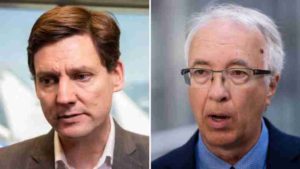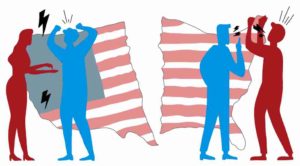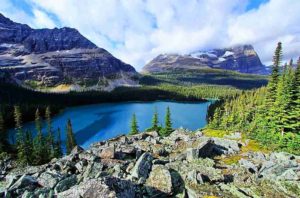
B.C. Premier David Eby has attacked the B.C. Conservatives over abortion, race and gender identity. B.C. Conservative Leader John Rustad has been critical of Eby and the ‘radical NDP.’ | Photo: CBC.
On Tuesday evening, those who tuned into the contentious Kamala Harris-Donald Trump debate on ABC-TV witnessed the division and polarization that has come to frame realpolitik in the United States, and an ever more impactful defining feature of American politics over the past eight years, since Donald Trump first came down the elevator at New York City’s Trump Tower in 2015 to announce his Presidential bid to secure the Republican Party nomination.
If polarization and division have become a defining feature of American politics, in the 2024 British Columbia provincial election, with an alt-right / far right, climate change skeptical Conservative Party of British Columbia emerging as a serious contender for government over the current centre-left B.C. New Democratic Party government led by Premier David Eby, this year’s provincial election is poised to be one of the most contentious in the province’s history.

The deep polarization between the B.C. New Democrats and the B.C. Conservatives reflects a broader national and global trend, with political forces on the left and far right dominating the discourse.
The NDP is often seen as a left-leaning, socialist party, while the B.C. Conservatives, as we say above, have gained a reputation for being alt-right or far right, especially on social issues.
As both parties position themselves on opposite ends of the political spectrum, the rhetoric, contentious statements, and ideological battles between them have intensified, creating an atmosphere of division.
Polarization in British Columbia Politics
British Columbia has long been a politically diverse province, with both urban and rural areas reflecting distinct priorities and values.
Traditionally, the province has seen competition between the NDP, representing progressive, labour-oriented interests, and the B.C. Liberals, a more centrist / centre-right party. However, the resurgence of the B.C. Conservatives the last couple of years, combined with the decline of the B.C. Liberals / B.C. United, has created a new dynamic.
The NDP has consolidated its hold on progressive voters, while the Conservatives have catered to socially conservative and populist sentiments, giving rise to a polarized political landscape.
The B.C. NDP, under Premier David Eby, champions policies focused on climate action, the construction of affordable housing for various economic stratas, public transportation, social welfare programmes, and expanding public services.

A B.C. Conservative Party government would walk away from the province’s commitment to protect 30% of British Columbia’s wilderness land base by 2030, says party leader John Rustad .
These priorities resonate with urban voters, particularly in Vancouver and other metropolitan areas.
The NDP’s approach to addressing issues like affordable housing, health care, and environmental sustainability has been lauded by progressives but criticized by opponents as being overly ambitious and fiscally irresponsible.
On the other side, the B.C. Conservatives have positioned themselves as defenders of traditional values — for instance, the province’s SOGI 123 programme, which protects the interests of LGBTQ students — and individual freedoms.
#bcpoli Even friendly on Rustad says “some candidates who have called LGBTQ people “degenerates,” claimed COVID-19 vaccines give you magnetism, believed …, claimed 5G signals lead to genocide, and called for criminal investigations into Dr. Bonnie Henry https://t.co/kbZu4EKqkk
— David Schreck (@StrategicThghts) September 5, 2024
The B.C. Conservative Party has gained traction among rural voters and those disillusioned with the political establishment.
With rhetoric that often borders on populism, the B.C. Conservatives, under the leadership of John Rustad, have campaigned on issues like opposing carbon taxes, promoting resource extraction, and resisting what they view as “woke” progressive policies, including LGBTQ+ rights and climate change initiatives.
This sharp ideological division has made co-operation and compromise between the two parties seem increasingly unlikely.
Contentious Statements from the B.C. NDP and B.C. Conservatives
Both current British Columbia political parties have made highly charged statements about one another, fueling the perception that this election is about more than just policy — it’s a battle over the future direction of the province.
The following was tweeted out by a retiring B.C. United MLA …
Wow. If I follow this way of thinking, this means women shouldn’t vote and should not be elected to government? A large percentage of undecided voters in BC are women and I can’t imagine this will make them too comfortable. https://t.co/vHkOd3h9iO
— Karin Kirkpatrick ?? (@KirkpatrickWVC) September 3, 2024
The B.C. NDP has painted the B.C. Conservatives as being out of touch with modern British Columbia, accusing them of aligning with far-right extremism.
Premier Eby and his colleagues have criticized the B.C. Conservatives for their stance on climate change, with NDP officials often labeling them as “climate change deniers” and suggesting that their policies would set the province back decades in the fight against global warming.
John Rustad’s candidate posts so many disturbing opinions on abortion, breastfeeding, and now the age of consent.
These concerning opinions tell you all you need to know about Rustad’s BC Conservatives.
Imagine them making decisions on behalf of women in BC. https://t.co/chy3SCssoN
— Niki Sharma (@NikiSharma2) September 6, 2024
Furthermore, the B.C. NDP has accused the B.C. Conservatives of being hostile to diversity and inclusion, particularly regarding LGBTQ+ rights, with some NDP members framing the B.C. Conservative agenda as “regressive” and “intolerant.”
As a young woman who experienced first hand the devastating cuts to sexual assault centres & support in the 2000s under John Rustad, I can absolutely without hesitation say that access to women’s healthcare is on the ballot this election. Conservatives want us to forget their… https://t.co/4Ma6ab9I9D
— Jodie Wickens (@jbtwickens) September 11, 2024
In response, the B.C. Conservatives have launched attacks on the NDP, framing the ruling party as being out of step with the needs of ordinary British Columbians.
B.C. Conservatives have characterized the NDP’s policies as “socialist overreach,” arguing the government is infringing on individual freedoms and burdening taxpayers with excessive regulations and taxes.
Hey @JohnRustad4BC is this your official position? https://t.co/LBQSci5zfc
— Adam Olsen (@AdamPOlsen) September 5, 2024
The B.C. Conservatives have taken aim at the NDP’s environmental policies, particularly the implementation of carbon taxes and clean energy initiatives, which they argue hurt the economy and disproportionately affect rural communities dependent on resource industries.
The B.C. NDP is proving they are incapable of handling taxpayers’ dollars. #bcpoli pic.twitter.com/eccizHzNVn
— Conservative Party of BC (@Conservative_BC) September 11, 2024
The B.C. Conservative Party leadership has also criticized the NDP for what they see as pandering to special interest groups, claiming the government is more focused on identity politics than on addressing inflation, crime, and economic growth.
As such, the B.C. Conservatives have taken a page out of Donald Trump’s MAGA Republican playbook, which has proved successful in the United States. We’ll have to wait until the evening of Saturday, October 19th to see whether the Trump-like B.C. Conservative electoral strategy bears fruit at the polls, and allows them to form government.
The 2024 B.C. Election May Become The Most Contentious On Record
Several factors make the upcoming election in British Columbia particularly contentious. First, the ideological gulf between the B.C. NDP and the B.C. Conservatives is wider than ever.
Appalling. BC Conservative candidate Tim Thielmann just launched this bigoted attack on racialized NDP MLAs.
Reducing me and other MLAs to our skin colour is the same old Trump politics meant to divide us. @JohnRustad4BC are you really ok with this? pic.twitter.com/2ZVtkADAvS
— Aman Singh (@AmanSinghNDP) September 9, 2024
While previous elections in the province have often involved debates over centrist policies, this election is shaping up to be a choice between two starkly different visions for the future. On one side is the NDP’s progressive, environmentally conscious, and socially inclusive platform, and on the other is the B.C. Conservatives’ economically libertarian, socially conservative, and resource-focused agenda.
John Rustad says we can’t be harmed by carbon pollution because we’re carbon-based. This is the same logic as saying a brick to the head won’t hurt you because we’re both made of atoms. Utterly moronic conspiracy views. #UnfitToLead #bcpoli https://t.co/pjcN1NJZfZ
— Jeffrey Ferrier (@jtferrier) September 3, 2024
Second, the stakes are high for both parties.
The B.C. NDP is seeking a mandate to continue its transformative policies, particularly around climate action and social justice, while the B.C. Conservatives are eager to capitalize on voter discontent.
For many voters, the upcoming election is about more than just political leadership — it’s about the soul of British Columbia itself.
Urban voters, particularly in Vancouver and Victoria, may see the election as a referendum on progressive policies, while rural voters view it as a chance to push back against what they perceive as an out-of-touch government.
Broader national & global trends are influencing B.C.’s upcoming election
Across Canada and other Western democracies, political polarization has increased, with far-right and far-left parties gaining ground as centrist parties struggle to maintain relevance.
In British Columbia, this trend is magnified by the province’s unique political landscape, where environmental concerns and social issues intersect with a resource-based economy.
With the B.C. Liberals / B.C. United Party having abandoned its bid for government, the resulting fight between the B.C. NDP and the B.C. Conservatives represents a new era in provincial politics, one where compromise seems unlikely, with the stakes being higher than ever.
As the election approaches — the Writ will be dropped on Saturday, September 21st, at which time the election will be officially underway — the rhetoric between the two parties is intensifying, with each accusing the other of being out of touch with the province’s needs.
With so much at stake — climate action, housing, economic development, social justice, and the future direction of British Columbia — B.C.’s upcoming election is likely to prove to be a pivotal moment in the province’s social and economic history, setting the stage for B.C.’s political trajectory for years to come.
